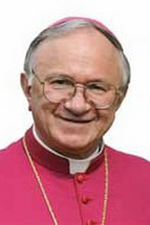We honor with fraternal solidarity and spiritual closeness those who faithfully and sensitively observe World AIDS Day 2011. Not many have been unaffected by HIV/AIDS: we know someone directly or have been acquainted with someone who has had the devastating disease of HIV/AIDS. I’ve known several people who died due to complications of AIDS or know people who live with the disease today. There’s 33 million people affected by the disease. How can a heart centered on the Lord be unmoved by our brothers and sisters who struggle to live with uncertainty?
Archbishop Zygmunt Zimowski, 62, the President of the Pontifical Council for Health Care Workers, wrote a letter on today’s observance. He notes some good stuff; challenging stuff for some, but things we need to grapple with if we are sincere in our pursuit of truth, goodness and beauty. His thinking in other places has asked for the international community to come together and work on diseases that are pandemic in nature because it is a matter of global security and solidarity. The Archbishop’s letter follows:
Pontifical Council for Health Care Workers
on the Occasion of the World AIDS Day 2011
The World AIDS Day of 2011 must constitute a new opportunity to promote universal access to therapies for those who are infected, the prevention of transmission from mother child, and education in lifestyles that involve, as well, an approach that is truly correct and responsible as regards sexuality. In addition, this is a privileged moment to relaunch the fight against social prejudice and to reaffirm the need for moral, spiritual and – as far as this is possible – material proximity to those who have contracted the infection and to their family relatives.
Although the international community began to work against this infection over twenty years ago, unfortunately it is estimated that 1,800,000 people still die every year because of HIV. These are people who could lead normal lives if they only had access to suitable pharmacological therapies, those known as antiretroviral therapies.
Deaths are thus witnessed that are no longer justifiable, just as the pain of the relatives of the people involved, the impoverishment of their family units, the increase in their marginalization, and the malaise of children who have become orphans, often at a very early age, can no longer be justified. By now the transmission of the infection from mothers to their children, who often become its victims even before they begin to see the outlines of the world that surrounds them, equally, cannot be justified.
Although the extension of these therapies to all peoples and to all the parts of a population is something that cannot but be engaged in, of fundamental importance, on the other hand, remains the formation, the education, of everyone, and in particular the new generations, in a sexuality based upon ‘an anthropology anchored in natural law and illuminated by the Word of God’. The Church and her Magisterium ask for a lifestyle that privileges abstinence, conjugal faithfulness and the rejection of sexual promiscuity, because, as the Post-Synodal Apostolic Exhortation Africae Munus emphasized, all of this forms a part of the question of the ‘integral development’ to which people and communities have a right.
In launching this new appeal for commitment and solidarity in favor of all the (both direct and indirect) victims of HIV/AIDS, we would like to thank, in union of spirit with the Holy Father, all those who have striven, often for very many years, to help them. We are referring here to institutions, agencies and volunteers who ‘work in the sector of health care and especially of AIDS’ and who engage in ‘wonderful and important work’, and who, without doubt, deserve the operational support, and support without ideological ties, of international organizations and benefactors.
Lastly, we wish to express our proximity to people afflicted by HIV/AIDS, to those who are near to them, and to all those health-care workers who, being exposed to the risk of infection as well, provide all possible care to them, respecting their personalities and their dignity.
Zygmunt Zimowski
President of the Pontifical Council for Health Care Workers

